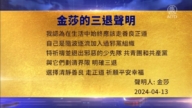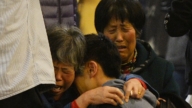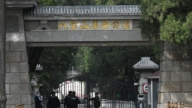【新唐人2013年07月26日讯】清华大学法学博士王进文在美国《纽约时报》撰文说,在刚刚过去的一周,中国有两件司法案子,引起了人们的强烈关注与激烈争论。那就是受贿六千万的前铁道部部长刘志军被判“死缓”;而湘西地产商人曾成杰被秘密处死。中国民众用了一个新的词语来讽刺这种现状,叫“死刑双轨制”。
湖南法院在未通知家属的情况下处死曾成杰,最初的解释是﹕曾成杰在被执行死刑前没有提出会见家属的要求。后来,法院再解释说﹕法院没有曾成杰家属的联系电话。
清华的法学博士王进文撰文指出,在法院都难以自圆其说的情况下,不得不令舆论怀疑﹕这其中必有隐情。
北京外国语大学新闻学副教授乔木:“好多人说,曾成杰虽然零八年就判了死刑,但是最高法院一直没有核准,也没有执行,但是当湖南省的最高领导、一把手从湖南调到最高法院当了院长以后,很快不到三个月就核准执行。”
王进文文章说,在立法与司法层面普遍认可了非暴力犯罪不处以极刑的原则下,曾成杰仍然被执行死刑,不能不令人感到震惊。基于身份之不对等形成的不同结果,已经使得“法律面前人人平等”的基本原则落空,“罪刑法定”也因人为原因变得模糊甚至扭曲。
北京凯泰律师事务所律师谢燕益:“现在的中国社会,普通公民对于司法,对于法律没有任何的信任感。甚至是对于法律的信任已经到了绝望的状态。曾成杰的案件又可以说是出现了这么一个死刑,而且程序都是违法的,无异于给民间依法治国希望啊,给予了一个毁灭性的打击。”
中国在2011年2月25号通过的刑法修正案中,取消了13个经济性非暴力犯罪死刑罪名,包括﹕票据诈骗罪、金融凭证诈骗罪、信用证诈骗罪等。当时法学界还就“集资诈骗罪”是否废除死刑进行了争论。
北京“瑞丰律师事务所”律师李方平指出,中国的反贪起点很低,贪污十万就可以判死刑,一万的话就可以追究刑事责任。但是实际上官、民之间的量刑反差很明显。
北京瑞丰律师事务所律师李方平:“ 很多的,尤其是高官,很少有死刑。有一些如果没有职务的话,假如说贪污几百万,上千万的话,不可避免的可能要处以死刑。而且一些民间的企业家因为融资等等问题,所谓的经济犯罪,也判处死刑。”
王进文认为,死刑缓期执行,作为中国特有的刑罚种类,实际效果可被视为是对死刑的“变相否定”。但在中国,“死缓”这种特殊的刑罚,在量刑中经常面临不确定性和模糊地带。
谢燕益:“如果这种状况持续下去的话,是很危险的。现在这个依法治国、法律实际上在中国这个现实环境中的尴尬境地,完全沦为一种政治工具。而且,它完全是没有掩饰,就非常露骨的对于官僚权贵利益的袒护,对于民间的、普通的刑事案件的严刑峻法。”
山东“岳首律师事务所”律师赵永林指出,“死刑双轨制”是政治上的不公正在法律层面的延伸。从政治层面,包括公民的基本权利和官员的权利,采取两个标准。
山东岳首律师事务所律师赵永林:“深层的原因还是国家的根本制度。没有建立起一个公民社会,没有一个建国的基本理念,我们国家到底是一个公民的国家﹖还是一个特权阶层的国家?政治层面上一些最基本的价值观解决不了,那么在法律层面上无非就是这些不公正的一个投影罢了。”
王进文警告,曾成杰案件突显了民营企业的生存困境,既需要依附于权力,又随时有被权力吞噬的危险。
采访编辑/秦雪 后制/陈建铭
Liu Zhijun vs. Zeng Chengjie: Death-Penalty Dual-Track
Wang Jinwen, a law doctor from Tsinghua University,
published an article in US newspaper the New York Times
which says there were two judicial cases last week
that aroused strong concern and intense debate.
Former railway minister Liu Zhijun was given a suspended
death sentence for taking 60 million yuan in bribes;
while Zeng Chengjie, a property developer in Xiangxi,
was secretly executed.
Chinese people created a new phrase to satirize it,
“dual-track of death penalty."
Hunan court executed Zeng Chengjie without notifying
his family.
The court initially explained that Zeng didn’t ask to see
his family before execution.
Later, the court also explained that they didn’t have
the contact information of Zeng’s family.
Tsinghua University law doctor Wang Jinwen
wrote in the article that it’s very suspicious that
the court couldn’t explain itself.
here must be hidden factors.
Qiao Mu, an Associate Professor of Journalism,
Beijing Foreign Studies University: “Although Zeng Chengjie
received the death penalty in 2008, the Supreme Court
neither approved it, nor enforced it until less than
three months after Hunan’s highest official was transferred
to be the president of the Supreme Court."
Wang Jinwen’s article indicates that it’s shocking that
Zeng was executed when the legislative and judicial levels
generally recognized that non-violent crimes
don’t receive capital punishment.
People receive different sentences due to their identities,
which ignores the basic principle of “equality before law."
“Legally Prescribed Punishment" is blurred and distorted
due to human causes.
Lawyer Xie Yanyi, from Beijing Kaitai Law Firm:
“Common Chinese citizens trust neither the judicial system
nor the legal system nowadays.
They hold no hope for the legal system.
Zeng Chengjie was executed.
All the procedures were illegal, which ruined
people’s hope for the legal system."
13 economic nonviolent crime death penalty charges were
abolished in the Criminal Law Amendment on Feb. 25, 2011,
such as bills fraud, financial certificate fraud,
letter of credit fraud, and so on.
Legal experts debated whether the death penalty
for financial fraud should be abolished or not.
Lawyer Li Fangping from Beijing Ruifeng Law Firm says
the amount of corruption is very low to cause such punishment.
100,000 yuan in bribes can result in the death penalty.
10,000 yuan in bribes can be held criminally responsible.
However, sentences given to high level officials
and common people are very different.
Lawyer Li Fangping from Beijing Ruifeng Law Firm:
“Many people, especially high-level officials,
don’t receive the death penalty.
Some officials without duties, if they take tens of millions
in bribes, may not avoid the death penalty.
However, some private entrepreneurs received the death
penalty because of financial fraud, so-called economic crime."
Wang Jinwen believes “suspended death"
is China’s special penalty.
It can be considered a denial of the death penalty in disguise.
But in China, there’s often uncertainty and ambiguity
when handing down “suspended death."
Xie Yanyi: “It’s very dangerous to let this situation continue.
In the real environment of China, the rule of law is actually
completely used as a political tool.
It also obviously shields bureaucrats and bigwigs’ interests,
and sentences severe penalties to the people’s criminal cases."
Lawyer Zhao Yonglin from Shandong Yueshou Law Firm
says “dual-track of death penalty" is an expansion of political injustice on the legal level.
There are two standards for citizen’s basic rights
and officials’ rights on the political level.
Lawyer Zhao Yonglin, Shandong Yueshou Law Firm:
“The deeper reason is the country’s fundamental system.
Without building a civil society, without a basic idea
of the founding, what kind of nation is our country?
Is it a nation of citizens?
Or a nation of privileged classes?
If some basic values can’t be found on the political level,
the injustice has to impact the legal level."
Wang Jinwen warns that Zeng Chengjie’s case shows
the difficulty private enterprises will face in order to survive.
they will need to attach themselves to the authority,
but also take the risk of being devoured by the authority.

























